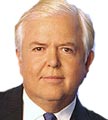
Lou Dobbs
Bush's bold bid
http://www.jewishworldreview.com | In the past few days there have been a lot of surprised gasps and some unsurprising partisan carping over the boldness of President Bush's economic stimulus plan. But, given the challenges we now face, would a less ambitious plan have been appropriate?
This economy is caught in an atypical recovery following an atypical recession. The stock market has fallen for three straight years. The weak holiday retail season has raised concerns that consumers may finally be curbing their spending. And we're fighting radical Islamist terrorism worldwide and preparing for war against Iraq.
In these times, bold is the best policy option.
But you wouldn't know that from listening to the Democrats. Instead of recognizing and responding to the fundamental changes facing our economy and nation, the Democrats have offered up a "stimulus light" plan that would maintain the status quo. And they've offered up the same tired arguments in support of their same tired ideas on the economy.
First, they attacked Bush for focusing too much on the war on terror and not enough on the economy. As I've written, the two issues are in no way mutually exclusive. Further terrorist attacks on domestic soil are among this country's biggest economic threats. The Brookings Institution estimates that a biological attack in a major urban area could cause $750 billion in economic damage. Politics and economics can't be separated.
Then, the Democrats accused the president of irresponsible spending and deficit creation. However, as Robert Reich, President Clinton's former labor secretary, recently wrote, "These Democrat deficit hawks have it all wrong. The economy needs a fiscal stimulus right now, which means the federal government has to run large deficits."
Now, the Democrats are using the "class warfare" tactic. It's the same sort of attack that successfully sank the elder George Bush's re-election bid, a bitter defeat that continues to instruct the younger Bush. But the core of the Bush package eliminates dividend taxes, benefiting the nearly 70 percent of voters who invest in the markets and also many seniors who rely on dividend income. And the plan targets working families, small businesses and the unemployed.
However, the president's boldness could still backfire.
A debate has already begun over whether the Bush plan is less a stimulus package and more a long-term restructuring of the tax system. If it turns out to be the latter, voters may not feel much better about the economy by the time they go to the polls in 2004.
And that leads to what could be Bush's biggest challenge. By introducing such an ambitious package, he raised expectations that fiscal policy can stimulate the economy at a time when so many variables still exist, such as a possible war against Iraq and higher oil prices.
There's also the problem of Republican unity. Already, Sen. John McCain, who is making a career out of being a malcontent, is rumbling about more middle-class tax relief. While Bush enjoys a majority in both the House and the Senate, that majority is slim and still could splinter.
Democrats can also look back and learn from the 1992 presidential election cycle. The Democrats' relentless harping about the economics problems dropped the elder Bush's approval rating from 89 percent to 29 percent in just 17 months, even though the economy was growing.
Democrats will try to work this message again if the Bush plan does not work relatively quickly. Bush needs a strong economic recovery between now and election day. He's chosen a bold plan to make it happen, but that shouldn't come as a surprise. Given the challenges facing this economy and the nation, and given the history of the first President Bush, did he really have a choice?
Enjoy this writer's work? Why not sign-up for the daily JWR update. It's free. Just click here.
Lou Dobbs is the anchor and managing editor of CNN's "Lou Dobbs Moneyline." Comment by clicking here.
01/07/03: The only thing certain is uncertainty
12/30/02: No need to be so negative as new year approaches
12/23/02: NY's AG deserves credit for settlement
12/18/02: Critics of Bush nominees should tone down rhetoric
12/09/02: A lot rides on prez's Treasury pick
12/04/02: A fast fix for corporate credibility?
11/26/02: Urge to merge is hard to resist
11/19/02: Are we really so bad off?
11/12/02: Bush's lucky week bodes well for recovery
11/05/02: Wall Street firms treat investors as fools
10/29/02: Earnings estimates offer some hope
10/22/02: Economy's strength tied to national security
10/17/02: Harvey Pitt, get real!
10/08/02:Are we experiencing the fall before the rise?
10/01/02: Concerns about earnings are justified
09/24/02: Business leaders must abandon stall tactics
09/17/02: Wall Street's reality check
09/12/02:
There's no better time for leaders to show resolve

